Latest Research Publications
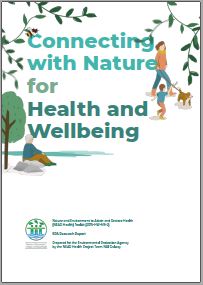
Research 348 Toolkit: Connecting with Nature for Health and Wellbeing
Authors: Caitríona Carlin, Gesche Kindermann, Easkey Britton, Martin Cormican, Christine Domegan, Mike Gormally and Diarmuid O’Donovan, October 2020
Year: 2020
This toolkit accompanies EPA Research Report 348: Nature and Environment to Attain and Restore Health (NEAR Health)
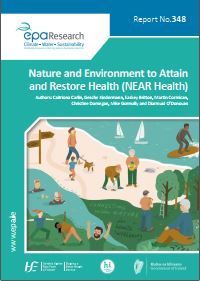
Research 348: Nature and Environment to Attain and Restore Health (NEAR Health)
Authors: Caitríona Carlin, Gesche Kindermann, Easkey Britton, Martin Cormican, Christine Domegan, Mike Gormally and Diarmuid O’Donovan, October 2020
Year: 2020
The NEAR Health project was jointly funded by the EPA and the HSE to investigate how nature and environment can help society attain and restore health. It investigated (1) how people value and experience nature, health and wellbeing, (2) the barriers and bridges to connecting with nature, (3) what people want from their healthy future environment and (4) nature-based activities that benefit people’s health and wellbeing.
Protecting and developing Ireland’s green and blue spaces to benefit our health and wellbeing
Year: 2020
Human health protection is a fundamental aspect of environmental protection. Our health is impacted by the air we breathe, the water we drink, the noise levels we experience, the food we eat, the spaces we spend time in, and our sense of wellbeing. This Brochure provides an overview and key findings of the three research projects jointly funded by the EPA and the HSE.
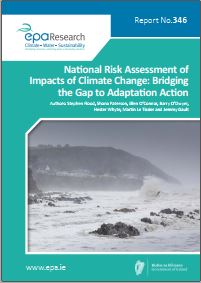
Research 346: National Risk Assessment of Impacts of Climate Change: Bridging the Gap to Adaptation Action
Authors: Stephen Flood, Shona Paterson, Ellen O’Connor, Barry O’Dwyer, Hester Whyte, Martin LeTissier and Jeremy Gault, October 2020
Year: 2020
Ireland’s climate is changing in line with global trends and this trend is expected to continue. This report presents its findings according to the NAF’s four themes: natural and cultural capital, critical infrastructure, water resources and flood risk management, and public health. The impacts of climate change will have direct relevance to the achievement of planning and development objectives and priorities within these themes.
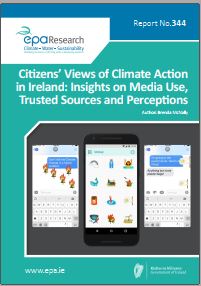
Research 344: Citizens’ Views of Climate Action in Ireland: Insights on Media Use, Trusted Sources and Perceptions
Author: Brenda McNally, September 2020
Year: 2020
As the physical impacts of climate change become more urgent and the subject of wider public concern, greater understanding of the societal responses will be needed. This project investigated citizens’ views of and media consumption about climate actions in Ireland. The report supports environmental policymaking by providing data to tailor communication about climate action and to broaden citizen engagement with climate change.
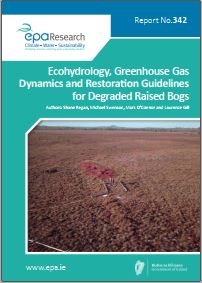
Research 342: Ecohydrology, Greenhouse Gas Dynamics and Restoration Guidelines for Degraded Raised Bogs
Authors: Shane Regan, Michael Swenson, Mark O’Connor and Laurence Gill, September 2020
Year: 2020
This report presents the results of an integrated scientific study on two raised bogs, Clara Bog, Co Offaly and Abbeyleix Bog, Co Laois, which are considered to be representative of lowland peatland conditions encountered in Ireland. To assess the restoration potential of degraded raised bog systems, and the level of management required to address the degradation, a simplified set of guidelines is provided as a summary in this report.
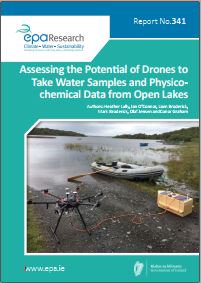
Research 341: Assessing the Potential of Drones to Take Water Samples and Physico-chemical Data from Open Lakes
Authors: Heather Lally, Ian O’Connor, Liam Broderick, Mark Broderick, Olaf Jensen and Conor Graham, September 2020
Year: 2020
Water sampling remains a key component in the monitoring and assessment of aquatic environments. Sampling requiring the use of a boat can lead to issues around accessibility, particularly at remote lakes where there may be a lack of a slipway. This research has successfully demonstrated that water chemistry data collected using drone water sampling methods are not statistically different from those produced by boat sampling.
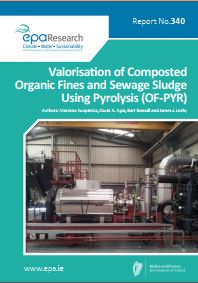
Research 340: Valorisation of Composted Organic Fines and Sewage Sludge Using Pyrolysis (OF-PYR)
Authors: Marzena Kwapinska, David A. Agar, Bart Bonsall and James J. Leahy, September 2020
Year: 2020
In Ireland, organic “fines” residue, derived from the separation of municipal solid waste and sewage sludge from municipal wastewater treatment plants, are currently processed for disposal as wastes. The Valorisation of Composted Organic Fines and Sewage Sludge Using Pyrolysis project (OF-PYR) investigated the potential of slow pyrolysis as a technology for their treatment as an alternative to other disposal options.
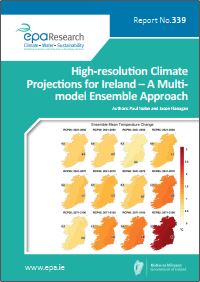
Research 339: High-resolution Climate Projections for Ireland – A Multi-model Ensemble Approach
Authors: Paul Nolan and Jason Flanagan, September 2020
Year: 2020
In this study, regional climate models were employed to dynamically downscale the coarse information of Global Climate Models to provide detailed projections of 21st-century regional climate change in Ireland. The projections were run at high spatial resolution (4 km grid spacing), allowing a more accurate evaluation of the local impacts of climate change.
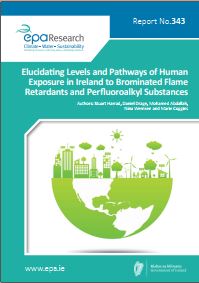
Research 343: Elucidating Levels and Pathways of Human Exposure in Ireland to Brominated Flame Retardants and Perfluoroalkyl Substances
Authors: Stuart Harrad, Daniel Drage, Mohamed Abdallah, Nina Wemken and Marie Coggins, September 2020
Year: 2020
Brominated flame retardants (BFRs) and perfluoroalkyl substances (PFASs) have been used extensively in applications such as electrical goods, soft furnishings and building insulation foam. The ELEVATE project generated data to facilitate the assessment of human exposure to these chemicals.
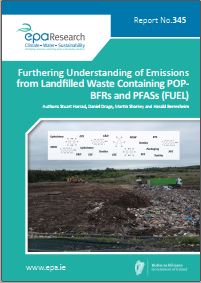
Research 345: Furthering Understanding of Emissions from Landfilled Waste Containing POPBFRs and PFASs (FUEL)
Authors: Stuart Harrad, Daniel Drage, Martin Sharkey and Harald Berresheim, September 2020
Year: 2020
Brominated flame retardants (BFRs) and perfluoroalkyl substances (PFASs) have been used extensively in applications such as electrical goods, soft furnishings and building insulation foam. The FUEL project measured these chemicals in leachate from landfills, and collected air, soil and groundwater samples traceable to these landfills to further investigate.

Research 338: Greening Transport: Final Report
Authors: Brian Caulfield, Paraic Carroll, Shreya Dey, Bidisha Ghosh and Aoife Ahern, August 2020
Year: 2020
The Greening Transport project examined the behavioural response of commuters within the Greater Dublin Area, to a range of policy incentives to encourage travellers to make greater usage of sustainable travel modes for trips to places of work or education. The results suggest that policy incentives alone could lead to tangible improvements in commuting time and cost constitute valuable guidance and recommendations for policymakers.
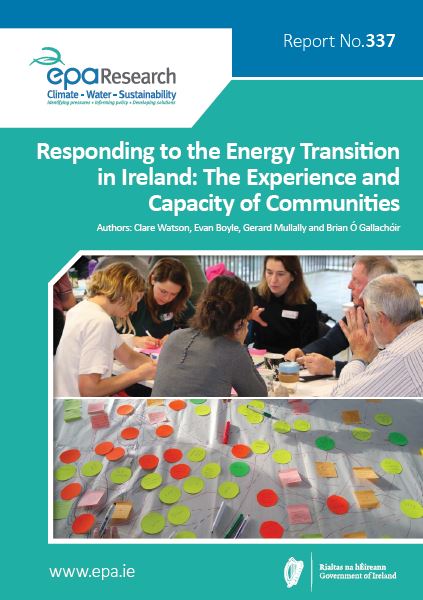
Research 337: Responding to the Energy Transition in Ireland: The Experience and Capacity of Communities
Authors: Clare Watson, Evan Boyle, Gerard Mullally and Brian Ó Gallachóir, August 2020
Year: 2020
Recently, Ireland has witnessed a significant increase in interest in and policy focus on the role of citizens and communities in the energy transition to a low-carbon future. This research project has engaged with community energy groups over a 3-year period and investigated how we might support the development of community capacity to effectively engage in energy transitions.
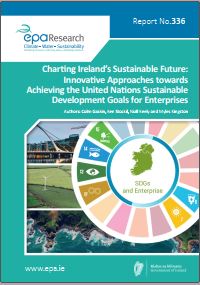
Research 336: Charting Ireland’s Sustainable Future: Innovative Approaches towards Achieving the United Nations Sustainable Development Goals for Enterprises
Authors: Colm Gaskin, Ken Stockil, Niall Keely and Myles Kingston, August 2020
Year: 2020
The Sustainable Development Goals (SDGs) are a call for change – a change to how we live, work, think and interact, both with each other and with our environment, to protect and secure our future and the future of the planet. This report captures the key recurring themes from Ireland’s engagement to date with the seven environmental SDGs and its role in supporting the private sector to deliver impactful contributions to these SDGs.
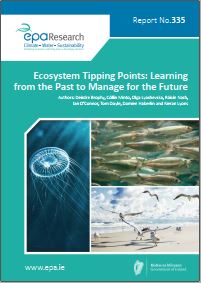
Research 335: Ecosystem Tipping Points: Learning from the Past to Manage for the Future
Authors: Deirdre Brophy, Cóllín Minto, Olga Lyashevska, Róisín Nash, Ian O’Connor, Tom Doyle, Damien Haberlin and Kieran Lyons, August 2020
Year: 2020
Marine ecosystems are undergoing unprecedented change, with natural capital declining to the point that benefits accrued by humans are at risk. This project aimed to collate and integrate datasets describing the Celtic Sea ecosystem, and to use this data to quantify how physical and biological ecosystem components have changed in recent decades and to establish relationships between ecosystem responses and external pressures.
Environmental impacts (positive and negative) flowing from COVID-19 and related measures
Authors: Eileen O’Leary, Safaa Al Tameemi, Sarah Broderick and Colman McCarthy, August 2020
Year: 2020
This report presents the findings from a small-scale research study on the main environment-related impacts arising from the COVID-19 experience in Ireland, both positive and negative. While focused primarily on the environmental effects, related effects such as changes in consumption, which have knock-on environmental impacts are also included.
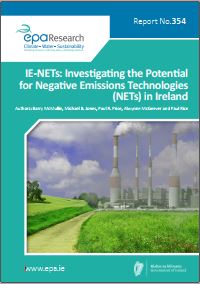
Research 334: Sustainable Voluntary Communities: Support for Sustainable Environmental, Social and Economic Development
Authors: Bernadette O’Regan, Richard Moles, Rosemary Byrne and Anne Bennett, August 2020
Year: 2020
The need to involve voluntary communities at local level in the implementation of successful sustainable development programmes to achieve reductions in greenhouse gas (GHG) emissions is widely recognised. This research identified 36 Irish communities that were, or were actively planning to be, involved in local-scale action to enhance sustainability. Six of the 36 were selected for this research project.
Covid-19 and Sheer Wellbeing 2020 - Access to and Use of Blue/Green Spaces in Ireland during a Pandemic
Authors: Gesche Kindermann, Christine Domegan and Sinead Duane, August 2020
Year: 2020
This Small-Scale Study looked at the access to and use of blue/green spaces in Ireland during a Pandemic. This report builds upon and extends Our Environment, Our Health, Our Wellbeing: Access to Blue/Green Spaces and Water Quality in Ireland (2017-HW-MS-12).
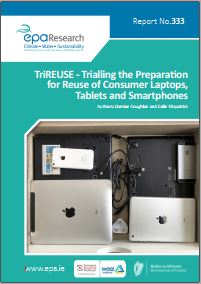
Research 333: TriREUSE – Trialling the Preparation for Reuse of Consumer Laptops, Tablets and Smartphones
Authors: Damian Coughlan and Colin Fitzpatrick, August 2020
Year: 2020
Information and communication technology (ICT) devices contain critical raw materials. The TriREUSE project aimed to provide an insight into possible reuse rates for WEEE collections that target consumer ICT products with reuse potential. The project involved a series of 10 dedicated collection events that encouraged people to dispose of old or unwanted data-bearing devices, with the incentive of a free data destruction service.
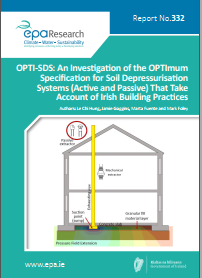
Research 332: An Investigation of the Optimum Specification for Soil Depressurisation Systems (Active and Passive) That Take Account of Irish Building Practices
Authors: Le Chi Hung, Jamie Goggins, Marta Fuente and Mark Foley, July 2020
Year: 2020
In Ireland, Radon is the second biggest cause of lung cancer and it is estimated that 9% of homes exceed the reference level of Radon. Studies in other countries have indicated that the effectiveness of passive sumps is enhanced by sealing across the base of the building. This project examines the characterisation of the T1 Struc and T2 Perm specified granular fill materials for soil depressurisation systems for buildings.